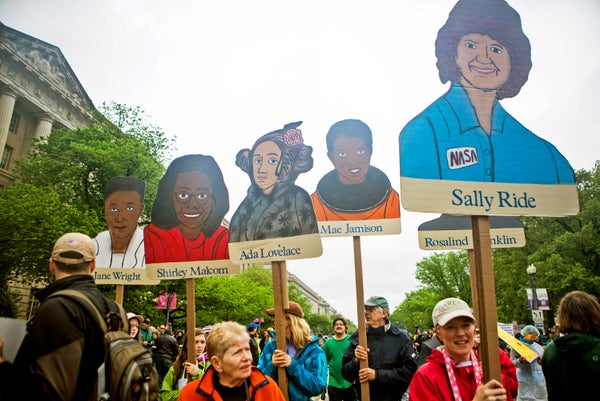This article was published in Scientific American’s former blog network and reflects the views of the author, not necessarily those of Scientific American
I am a scientist. I have always believed in the power of data in constructing persuasive arguments. But when it comes to creating a truly diverse scientific community, I have decided the time for data has passed.
This Saturday (August 19) I am scheduled to speak to graduate student women in science and engineering from nine New England universities who are creating a regional organization to represent their needs. This group is forming against the backdrop of acute public struggle over race and gender. As these women scientists come together at one end of Boston, a so-called “free speech” rally will be gathering downtown, reportedly featuring some of the same white supremacist speakers who triggered last week’s atrocity in Charlottesville. A second march protesting Google for perceived “silencing of dissent,” including the company’s response to last week’s anti-diversity manifesto, was planned but has since been cancelled.
I find this confluence of events to be no coincidence.
On supporting science journalism
If you're enjoying this article, consider supporting our award-winning journalism by subscribing. By purchasing a subscription you are helping to ensure the future of impactful stories about the discoveries and ideas shaping our world today.
Twelve years ago, I was a graduate student in science at Harvard University, when the university’s then-President Lawrence Summers made his infamous remarks speculating that “innate” differences between men and women were responsible for the under-representation of women in the sciences at his and other major universities. In the aftermath of his remarks, our graduate program convened all women students for an opportunity to vent, ask questions and raise issues of concern. I still have my notes on the questions that were asked, and year after year I hear groups of women raising the very same issues we raised twelve years ago. These include the struggle to find role models and mentors; the perpetual lack of everything from conference speakers to supervisors who look like us; fears about career penalties based on gender, race or having a family; being talked over and talked down to; and feeling unsafe in the lab and out of it.
Just last month, a survey of astronomers and astrophysicists found overwhelmingly that women in those fields, especially women of color, experienced harassment and unsafe situations due to gender, race and physical ability. Women reported skipping fieldwork and professional events out of fear for their safety; the need to protect themselves is directly detrimental to their careers.
If this is what is happening within the rarified atmosphere of scientific research, it should be no surprise that in the course of 10 days this month we will witness not only a viral manifesto from a tech employee railing against diversity programs at Google, but physical manifestations of discrimination and outright hatred against women and people of color across our country.
The approach we have been taking—of trying to convince everyone that diversity is good and hoping they take action from there—is not working. Instead, it’s time for good old-fashioned labor organizing. The task must fall, at least in part, to groups like the one I will speak to this weekend. Sharing experiences and providing mutual support and peer mentorship are valuable and important for women and people of color in the sciences and technology. They are simply not enough. These groups must start advocating for policy change within their institutions.
There is ample precedent for the power of organized action to change academia. Faculty and unionized personnel at multiple universities have used collective action to secure contract changes. While not formally unionized, the National Postdoc Association has successfully lobbied federal science agencies first to establish and then to increase minimum salary levels for postdoctoral fellows.
If any sector in America has the clout and the resources to recruit, promote and support the best scientific talent of all backgrounds, it’s our prestigious university system. We have to hold feet to the fire. Students, postdocs and faculty should press funding agencies to tie university training grants and similar support to the achievement of genuine diversity benchmarks. This starts with recruitment both of faculty and students. Successful examples exist. MIT’s Mechanical Engineering department has recently demonstrated the power of actively inviting diverse candidates to apply for faculty jobs, and the effect their hiring has in turn on recruiting and retaining a more diverse student body.
Hiring and admissions are the just the beginning, and we must hold our institutions accountable to holistic change. The real diversity of students and faculty must be accurately represented in speakers chosen for seminars and members of departmental committees. The entrenched culture of STEM classes must be conscientiously shifted, as Harvey Mudd College has so prominently undertaken in computer science. Faculty members should be compensated for the extra time and effort they put in to mentor the students who need them as role models. Promotion and tenure should take into account all these efforts a professor makes to enhance the practice of science, not just her publication record. And we need to examine policies that will properly support researchers in work-life balance.
Preliminary evidence indicates that gender-neutral tenure-extension policies for new parents actually favor men. The answer isn’t scrapping the attempt altogether; women need to press for testing other solutions.
To be sure, it will take hard work to turn these ideas into policies, and years to demonstrate positive results. The last week has shown, however, that we cannot afford to wait for trickle-down diversity to take effect. We must insist on policy changes first. Hearts and minds can follow later.
